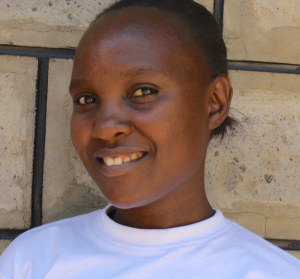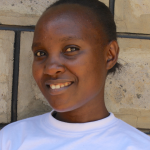May, 2020: COVID-19 Prevention Training Update at Musiachi Community, Mutuli Spring
Our teams are working on the frontlines of the COVID-19 pandemic. Join us in our fight against the virus while maintaining access to clean, reliable water.

We are carrying out awareness and prevention trainings on the virus in every community we serve. Very often, our teams are the first (and only) to bring news and information of the virus to rural communities like Musiachi, Kenya.
We trained more than 20 people on the symptoms, transmission routes, and prevention of COVID-19. Before there were any reported cases in the area, we worked with trusted community leaders and the Water User Committee to gather community members for the training.

We covered essential hygiene lessons:
- Demonstrations on how to build a simple handwashing station
- Proper handwashing technique
- The importance of using soap and clean water for handwashing
- Cleaning and disinfecting commonly touched surfaces including at the water point.

We covered COVID-19-specific guidance in line with national and international standards:
- Information on the symptoms and transmission routes of COVID-19
- What social distancing is and how to practice it
- How to cough into an elbow
- Alternative ways to greet people without handshakes, fist bumps, etc.
- How to make and properly wear a facemask.
During training, we installed a new handwashing station with soap near the community’s water point, along with a sign with reminders of what we covered.

Due to the rampant spread of misinformation about COVID-19, we also dedicated time to a question and answer session to help debunk rumors about the disease and provide extra information where needed.
We continue to stay in touch with this community as the pandemic progresses. We want to ensure their water point remains functional and their community stays informed about the virus.
Water access, sanitation, and hygiene are at the crux of disease prevention. You can directly support our work on the frontlines of COVID-19 prevention in all of the communities we serve while maintaining their access to safe, clean, and reliable water.

March, 2020: Musiachi Community, Mutuli Spring Project Complete!
Musiachi Community now has access to clean water! Mutuli Spring has been transformed into a flowing source of water thanks to your donation. We protected the spring, constructed 5 sanitation platforms for different households in the community, and we trained the community on improved sanitation and hygiene practices.
"The water is now clean and easy to fetch. May God bless you for the good work that you have done for us. This change has been longed for since I was born in 1960," said farmer Mr. Ernest Arambe.

Community members celebrate the newly completed spring
Spring Protection
Community members provided all locally available construction materials, including bricks, wheelbarrows of clean sand, stones, and fencing poles. Accommodations and meals were provided for the artisan, too.
The Process
Women and men lent their strength to the artisan to help him with manual labor. The spring area was excavated to create space for setting the foundation of thick plastic tarp, wire mesh, and concrete. After the base had been set, both wing walls and the headwall were set in place using brickwork. The discharge pipe was fixed low in place through the headwall to direct the water from the reservoir to the drawing area.

Bricklaying begins on the spring foundation
As the wing walls and headwall were curing, the stairs were set and ceramic tiles were fixed directly below the discharge pipe. This protects the concrete from the erosive force of the falling water and beautifies the spring. The process of plastering the headwall and wing walls on both sides reinforces the brickwork and prevents water from the reservoir from seeping through the walls and allows pressure to build in the collection box to push water up through the discharge pipe.

Plastering and cement work
The source area was filled up with clean stones and sand and covered with a thick plastic tarp to prevent potential sources of contamination. Then soil was layered on top of the tarp so that community members could transplant grass to prevent erosion. Finally, the collection area was fenced in. The only challenge we experienced during the entire construction process was the heavy rain in the evenings that chipped off the cement works which had to be redone some days.

Community members plant grass and fence in the spring box
Eventually, however, all works were completed and it then took about 2 weeks of patience for the concrete to dry. As soon as it was ready, people got the okay from our field officers to begin fetching clean water. We met them there to celebrate this momentous occasion. Happiness, thanksgiving, and appreciation were the order of the day flowing in all directions.

Happy faces at the spring
The assembled community members expressed their gratitude for the new water point. We could see their excitement and joy and we asked them to maintain the spring so that it could last for generations to come. They assured us they would do everything in their power to maintain the spring, as we would too if there were any major issues.

A girl smiles at the spring while holding leafy twigs used for sweeping the spring
"This is a very vibrant and highly cooperative community," said the lead Field Officer for this project, Jonathan Mutai.
"Any time we reported to the spring, all the community members would gather in just a few minutes to hear from us and provide anything that we needed. It was such a blessing to work with this community and we are looking forward to protecting all the high yielding springs that we were shown around the area."

A woman stands with the spring
Sanitation Platforms
All 5 sanitation platforms have been installed. These 5 families are happy about this milestone of having a private latrine of their own and are optimistic that people will no longer leave waste outdoors. We are continuing to encourage families to finish building walls and roofs over their new latrine floors.

A man gives thumbs up for his family's new sanitation platform
New Knowledge
Community member and village elder Mr. Joshua Wotsieli helped organize the training in coordination with our Field Officers Jonathan and Isabella. Together we found the community’s preferred date for training while considering other events in the community calendar such as the agricultural season and expected gatherings.
21 people attended training, which was conducted on a bright morning. The sun was shining but the temperatures were cool because it had rained all night. The participants sat on stones under some trees which provided shade and they were very comfortable. All of the attendees were very keen and attentive throughout the training, asking and answering questions when they needed clarification on the content.

Learning the 10 steps of handwashing
We covered several topics including community participation; leadership and governance; personal and environmental hygiene; water handling and treatment; operation and maintenance of the spring and sanitation platforms; dental hygiene; the 10 steps of handwashing, and how to make and use a tippy tap and leaky tin. During the leadership and governance session, we held an election for the leaders of the newly formed water user committee.

A woman demonstrates handwashing
A particularly memorable moment was when the facilitator was explaining the importance of the community's involvement and participation in the spring protection, reviewing their contributions such as materials, labor, and housing for the work team. One man interrupted the conversation and started accusing 2 others who were in charge of coordinating the project within the community of hiding money which the donors had brought for the benefit of the community. The facilitator saw this as an opportunity to clear the air because this is a common misconception in communities that can bring about conflicts. He explained that no money was given but only the materials, labor, and services such as the training itself and future monitoring and repairs. It took some time for everyone to fully come around to this explanation, but eventually, all members were seeing eye to eye and the and misunderstanding was cleared up.

Site management training at the spring under construction
Another memorable topic was the dental hygiene session. It was at this time that one of the participants brought out an old toothbrush which had turned black due to soot in their house. The facilitator saw that the brush was hardly being used and she urged the participants to use improvised dental hygiene materials like soft chew sticks instead of neglecting their teeth when they can not afford toothpaste.
We also brainstormed income-generating activities that can be used to start both a community savings account for any future minor repairs to the spring, as well as a cooperative lending group to enable members to develop their own small businesses.

Smiles at the spring
The community members agreed to fine anybody found violating the spring rules and that money would be used for minor repairs and maintenance. When an issue arises concerning the water project, the water user committee is equipped with the necessary skills to rectify the problem and ensure the water point works appropriately. However, if the issue is beyond their capabilities, they can contact our team of field officers to assist them. In addition, we will continue to offer them unmatchable support as a part of our ongoing monitoring and maintenance program.

A woman smiles in front of the new spring
"I'm glad that you have finally come into our community to enlighten us on how to maintain hygiene for general health and wellness. Musiachi is going to be healthier and the trips that women used to make to the dispensary to treat their children for diarrhea will reduce," said village elder Mr. Peter Mwombe.
Thank you for making all of this possible!


 Protected Spring
Protected Spring
 Rehabilitation Project
Rehabilitation Project









































